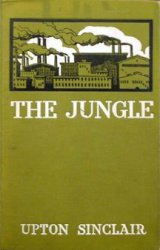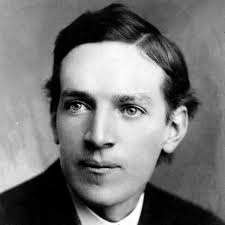The Jungle Page #14
The Jungle is a 1906 novel by the American journalist and novelist Upton Sinclair. Sinclair wrote the novel to portray the harsh conditions and exploited lives of immigrants in the United States in Chicago and similar industrialized cities.
The visitors were taken there and shown them, all neatly hung in rows, labeled conspicuously with the tags of the government inspectors--and some, which had been killed by a special process, marked with the sign of the kosher rabbi, certifying that it was fit for sale to the orthodox. And then the visitors were taken to the other parts of the building, to see what became of each particle of the waste material that had vanished through the floor; and to the pickling rooms, and the salting rooms, the canning rooms, and the packing rooms, where choice meat was prepared for shipping in refrigerator cars, destined to be eaten in all the four corners of civilization. Afterward they went outside, wandering about among the mazes of buildings in which was done the work auxiliary to this great industry. There was scarcely a thing needed in the business that Durham and Company did not make for themselves. There was a great steam power plant and an electricity plant. There was a barrel factory, and a boiler-repair shop. There was a building to which the grease was piped, and made into soap and lard; and then there was a factory for making lard cans, and another for making soap boxes. There was a building in which the bristles were cleaned and dried, for the making of hair cushions and such things; there was a building where the skins were dried and tanned, there was another where heads and feet were made into glue, and another where bones were made into fertilizer. No tiniest particle of organic matter was wasted in Durham's. Out of the horns of the cattle they made combs, buttons, hairpins, and imitation ivory; out of the shinbones and other big bones they cut knife and toothbrush handles, and mouthpieces for pipes; out of the hoofs they cut hairpins and buttons, before they made the rest into glue. From such things as feet, knuckles, hide clippings, and sinews came such strange and unlikely products as gelatin, isinglass, and phosphorus, bone black, shoe blacking, and bone oil. They had curled-hair works for the cattle tails, and a “wool pullery” for the sheepskins; they made pepsin from the stomachs of the pigs, and albumen from the blood, and violin strings from the ill-smelling entrails. When there was nothing else to be done with a thing, they first put it into a tank and got out of it all the tallow and grease, and then they made it into fertilizer. All these industries were gathered into buildings near by, connected by galleries and railroads with the main establishment; and it was estimated that they had handled nearly a quarter of a billion of animals since the founding of the plant by the elder Durham a generation and more ago. If you counted with it the other big plants--and they were now really all one--it was, so Jokubas informed them, the greatest aggregation of labor and capital ever gathered in one place. It employed thirty thousand men; it supported directly two hundred and fifty thousand people in its neighborhood, and indirectly it supported half a million. It sent its products to every country in the civilized world, and it furnished the food for no less than thirty million people! To all of these things our friends would listen open-mouthed--it seemed to them impossible of belief that anything so stupendous could have been devised by mortal man. That was why to Jurgis it seemed almost profanity to speak about the place as did Jokubas, skeptically; it was a thing as tremendous as the universe--the laws and ways of its working no more than the universe to be questioned or understood. All that a mere man could do, it seemed to Jurgis, was to take a thing like this as he found it, and do as he was told; to be given a place in it and a share in its wonderful activities was a blessing to be grateful for, as one was grateful for the sunshine and the rain. Jurgis was even glad that he had not seen the place before meeting with his triumph, for he felt that the size of it would have overwhelmed him. But now he had been admitted--he was a part of it all! He had the feeling that this whole huge establishment had taken him under its protection, and had become responsible for his welfare. So guileless was he, and ignorant of the nature of business, that he did not even realize that he had become an employee of Brown's, and that Brown and Durham were supposed by all the world to be deadly rivals--were even required to be deadly rivals by the law of the land, and ordered to try to ruin each other under penalty of fine and imprisonment! Chapter 4 Promptly at seven the next morning Jurgis reported for work. He came to the door that had been pointed out to him, and there he waited for nearly two hours. The boss had meant for him to enter, but had not said this, and so it was only when on his way out to hire another man that he came upon Jurgis. He gave him a good cursing, but as Jurgis did not understand a word of it he did not object. He followed the boss, who showed him where to put his street clothes, and waited while he donned the working clothes he had bought in a secondhand shop and brought with him in a bundle; then he led him to the “killing beds.” The work which Jurgis was to do here was very simple, and it took him but a few minutes to learn it. He was provided with a stiff besom, such as is used by street sweepers, and it was his place to follow down the line the man who drew out the smoking entrails from the carcass of the steer; this mass was to be swept into a trap, which was then closed, so that no one might slip into it. As Jurgis came in, the first cattle of the morning were just making their appearance; and so, with scarcely time to look about him, and none to speak to any one, he fell to work. It was a sweltering day in July, and the place ran with steaming hot blood--one waded in it on the floor. The stench was almost overpowering, but to Jurgis it was nothing. His whole soul was dancing with joy--he was at work at last! He was at work and earning money! All day long he was figuring to himself. He was paid the fabulous sum of seventeen and a half cents an hour; and as it proved a rush day and he worked until nearly seven o'clock in the evening, he went home to the family with the tidings that he had earned more than a dollar and a half in a single day!
Translation
Translate and read this book in other languages:
Select another language:
- - Select -
- 简体中文 (Chinese - Simplified)
- 繁體中文 (Chinese - Traditional)
- Español (Spanish)
- Esperanto (Esperanto)
- 日本語 (Japanese)
- Português (Portuguese)
- Deutsch (German)
- العربية (Arabic)
- Français (French)
- Русский (Russian)
- ಕನ್ನಡ (Kannada)
- 한국어 (Korean)
- עברית (Hebrew)
- Gaeilge (Irish)
- Українська (Ukrainian)
- اردو (Urdu)
- Magyar (Hungarian)
- मानक हिन्दी (Hindi)
- Indonesia (Indonesian)
- Italiano (Italian)
- தமிழ் (Tamil)
- Türkçe (Turkish)
- తెలుగు (Telugu)
- ภาษาไทย (Thai)
- Tiếng Việt (Vietnamese)
- Čeština (Czech)
- Polski (Polish)
- Bahasa Indonesia (Indonesian)
- Românește (Romanian)
- Nederlands (Dutch)
- Ελληνικά (Greek)
- Latinum (Latin)
- Svenska (Swedish)
- Dansk (Danish)
- Suomi (Finnish)
- فارسی (Persian)
- ייִדיש (Yiddish)
- հայերեն (Armenian)
- Norsk (Norwegian)
- English (English)
Citation
Use the citation below to add this book to your bibliography:
Style:MLAChicagoAPA
"The Jungle Books." Literature.com. STANDS4 LLC, 2025. Web. 10 Jan. 2025. <https://www.literature.com/book/the_jungle_272>.




Discuss this The Jungle book with the community:
Report Comment
We're doing our best to make sure our content is useful, accurate and safe.
If by any chance you spot an inappropriate comment while navigating through our website please use this form to let us know, and we'll take care of it shortly.
Attachment
You need to be logged in to favorite.
Log In